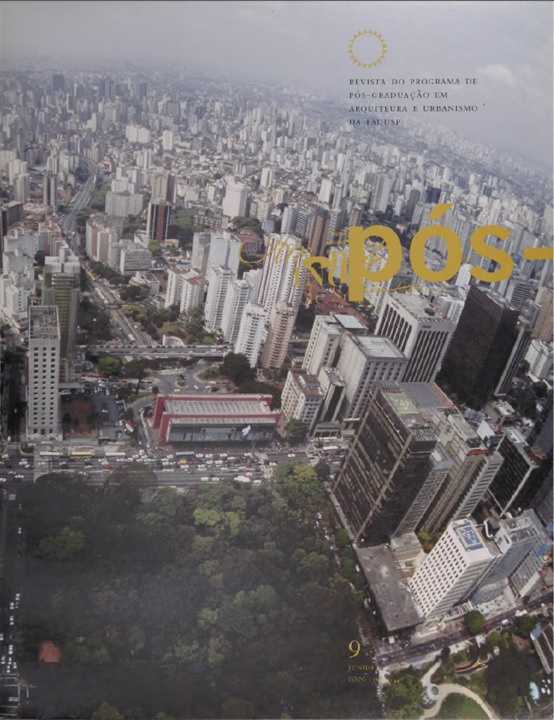Notas sobre a sala São Paulo e a nova fronteira urbana da cultura
DOI:
https://doi.org/10.11606/issn.2317-2762.v0i9p192-209Abstract
The former Júlio Prestes railway station, designed as the gateway to the coffee capital, was only inaugurated in 1938, after the crisis of 1929, and suffered from neglect for many years. Only now, recently converted into a modern concert hall, has the station apparently come into its own. Home to the new State of São Paulo orchestra, modernized by the conductor John Neschling, the Sala São Paulo is the major symbol of new cultural interventions in the city of São Paulo. In the heart of a run-down urban area known as “ Cracolândia" (crackland), the Sala São Paulo represents a glimpse of civilization in the midst of degradation, and promises to transform the whole surrounding area. More than this, the Sala São Paulo is being hailed as the watershed in a major turn-around in the fortunes of the center of the city: triggering, in addition to other cultural investments, a “ domino effect” in the renewed value and upswing of art and the real estate business. Relations between the State and the private sector, between high art and the real estate market, and the territorial struggle represented by this attempt of the social elites to take back the center of the city with their supposed civilizing project, pervade the history of the Sala São Paulo and are set forth in this articleDownloads
References
ANDRADE, Mário de. O banquete. São Paulo: Livraria Duas Cidades, 1977.
AR ANTES, Otília. Os dois lados da arquitetura francesa pós-Beaubourg. O lugar da arquitetura depois dos modernos. São Paulo: Edusp, 1993.
ARANTES, Otília, MARICATO, Ermínia, VAINER, Carlos. A cidade do pensamento único. Desmanchando consensos. Petrópolis: Vozes, 2000. Col. Zero à Esquerda.
BERMAN, Marshall. Notas sobre a modernidade em NY: Tudo que é sólido se desmancha no ar. São Paulo: Companhia das Letras, 1992.
BOURDIEU, Pierre. Livre troca. Rio de Janeiro: Bertrand, 1995.
DAVIS, Mike. C idade de quartzo. São Paulo: Scritta, 1997
DEUTSCHE, Rosalyn. Evictions. Art and spatial politics. Cambridge, Massachusetts: Graham Foundation/The MIT Press, 1996.
DUPRÉ, Nelson. A estação Júlio Prestes - O prédio. Estação Jú lio Prestes. São Paulo: BM&F, 2000. mimeo.
FIX, Mariana. Parceiros da exclusão. São Paulo: Boitempo, no prelo.
HADDAD, Fernando. Patrimonialismo e democracia. Folha de S. Paulo. São Paulo, 18 ago. 1999.
HADDAD, Fernando. Inauguração da Sala São Paulo. São Paulo: Osesp e Secretaria de Estado da Cultura, jul. 1999.
IZZO JR., Alcino, MEYER, Regina. Pólo Luz - Sala São Paulo, cultura e urbanismo. São Paulo: Viva o Centro, 2000.
OLIVEIRA, Francisco de. A privatização do público, destituição da fala e anulação da política: O totalitarismo neoliberal. In: Os sentidos da dem ocracia. Petrópolis: Vozes, 1999. (Col. Zero à Esquerda).
OLIVEIRA, Francisco de. Direitos do antivalor. Petrópolis: Vozes, 1998. (Col. Zero à Esquerda).
SCHWARZ, Roberto. Sete fôlegos de um crítico, e fim de século. Seqüências Brasileiras. São Paulo: Companhia das Letras, 1999.
SMITH, Neil. The new urban frontier- Gentrification and the revanchist city. Nova York: Routledge, 1996.
WISNIK, José Miguel. 0 minuto e o milênio ou por favor, professor, uma década de cada vez. Anos 70 - Música popular. Rio de Janeiro: Edição Europa, 1979.
Published
Issue
Section
License

This work is licensed under a Creative Commons Attribution 4.0 International License.
DIADORIM - Diretório de Políticas Editoriais












